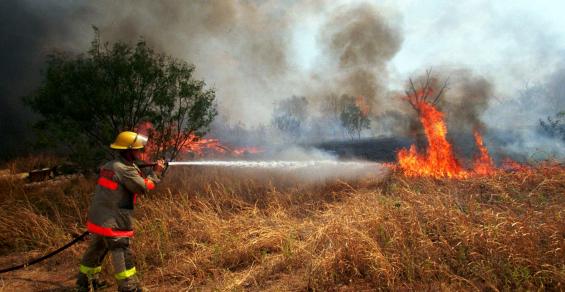One of my enduring memories will be traveling through the wide swaths of moonscape left behind by massive wildfires in the Texas Panhandle in 2006. Talking to the burned-out ranchers, some of who are friends, looking into their eyes as they battled back the tears, seeing the death and devastation left behind, are snapshots that will be with me forever.
Unfortunately, as we all know, devastating wildfires returned to the Great Plains, most recently last year and this spring. And, just like blizzards and other natural disasters, it’s reasonable to assume that wildfires will continue to be one of the many challenges facing ranchers in years to come.
Which brings me to the Oregon Cattlemen’s Association annual convention last week in Bend, where I was one of the speakers. One evening at dinner, I had the pleasure of getting to know Wes Morgan, manager of the Burnt River Irrigation District in Baker City, Oregon. In addition to his day job, Wes is also chief of the Powder River Rural Fire Protection District, a volunteer fire department that provides fire and EMS services to a fair chunk of ranchland in Eastern Oregon.
Watch: Picking up the pieces: How ranchers can deal with the emotional after-effects of natural disasters
After the usual small talk about the weather, how much rain they had, grass conditions and whatnot, Wes asked me if I ever talked with people from other rural volunteer fire departments. Specifically, he was curious if other departments are having the same trouble he has in finding younger members of the community to volunteer.
“No I haven’t,” I said and thus began the conversation about the struggles that his and many other volunteer fire departments are facing—keeping enough people to be able to provide the level of services that are needed when disaster strikes.
Volunteer fire departments are the first responders in any kind of fire, whether it’s a wildfire on private land or your barn burning down. Wes told me that volunteer firefighters have to go through the same training as firefighters who do it for a living, and it’s getting harder and harder to find people willing to invest the time and energy to be a volunteer.
Are those of you involved with volunteer fire departments or county government having similar challenges? What advice would you offer to Wes and other volunteer fire chiefs who are struggling to keep enough people on hand to effectively respond to the next wildfire?
Indeed, for many ranches, volunteer firefighters are their first line of defense. What can we do to keep that line strong and viable?




Leave A Comment